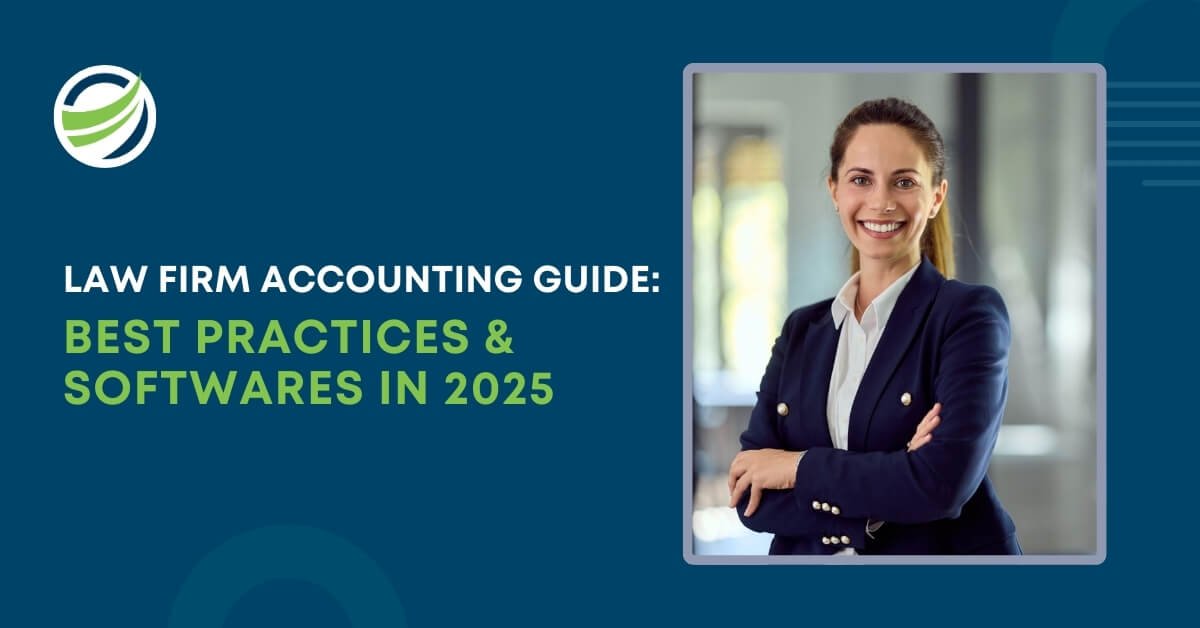In today’s legal industry, financial clarity is a strategic necessity, not just an administrative task. Unlike general business accounting, accounting for lawyers requires deep expertise in trust accounting, client fund management, and regulatory compliance. Without the right systems in place, firms expose themselves to compliance violations, tax complications, and financial instability.
As we move into 2025, law firms face growing complexity: evolving regulations, rising client expectations, and rapid advances in technology. To stay competitive, firms must adopt best practices and choose the best softwares for law office accounting, tools that balance compliance with efficiency while streamlining everyday financial management.
This guide outlines 10 proven law firm accounting best practices, plus the tools and strategies every firm needs for sustainable growth.
10 Law Firms Accounting Best Practices in 2025
1. Hire Experienced Accountants for Law Firms
You may excel at practicing law, but accounting for law firms is a specialised area with strict rules and compliance requirements. Hiring a professional ensures your finances are accurate, compliant, and audit-ready.
A skilled legal accountant understands trust accounting rules, client funds, and legal-specific reporting, protecting your firm from costly mistakes.
Steps to hire the right accountant:
- Define the role clearly, emphasizing trust accounting, financial analysis, and compliance expertise.
- Look for experience with law firm accounting softwares.
- Ask open-ended questions on tax planning, reporting, and financial controls.
- Verify certifications, references, and licenses.
- Offer proper onboarding and competitive pay to retain top talent.
Key interview questions:
- Are you experienced with trust accounting and compliance rules?
- What legal accounting softwares do you use?
- Have you worked with firms like ours?
- Can you support reporting and compliance needs?
- Do you have tax planning experience for law firms?
2. Choose the Right Bank Accounts
Every firm needs accounts to manage revenue, expenses, and client funds. Most use three main types:
- IOLTA (Interest on Lawyers’ Trust Account): For client funds held in trust.
- Business Checking: For operating revenue and expenses.
- Business Savings: For taxes, reserves, and emergencies.
When selecting a bank, confirm they understand law firm trust accounting requirements, offer fraud protection, and support multiple authorised users.
Proper law firm accounting helps determine which accounts fit your firm’s needs and which bank offers the right support. When comparing institutions, ask:
- What fees apply, and how can we avoid them?
- Are savings accounts, credit cards, and lines of credit available?
- Do you provide IOLTA and other trust account options?
- Can multiple users be set up with separate access?
- What security and fraud protections are offered?
3. Open Three Essential Accounts
Once you’ve selected a bank, ideally one experienced in law firm accounting services, set up these core accounts:
- Business Checking: For revenue deposits and day-to-day expenses like payroll, rent, and operations.
- Business Savings: Acts as a safety net for taxes, emergencies, and future investments, while strengthening your position when applying for loans.
- IOLTA Trust Account: Required for holding client funds separately until earned or disbursed.
A money market account can earn higher interest, though it often requires higher balances and has withdrawal limits.
Pro Tip: Bring the right documents when opening accounts, typically proof of registration, your EIN, and firm name details.
4. Understand Trust Account Rules
Trust accounting is one of the most critical and risky areas of legal accounting. Mistakes can lead to audits, penalties, or even disbarment. Follow these essentials:
Key non-negotiables:
- Keep funds separate: Use a dedicated IOLTA trust account. Never mix client money with firm funds.
- Follow state rules: Regulations vary. Always confirm requirements with your State Bar and consult accountants for law firms when needed.
- No borrowing: Client funds are never for business expenses, even temporarily.
- Transfer earned fees quickly: Move funds to your operating account once they are rightfully earned.
- Don’t misclassify deposits: Trust deposits are liabilities, not revenue.
- Track every penny: Maintain client-specific ledgers with detailed transaction records.
- Ask for help: When in doubt, consult a legal accountant or compliance advisor.
5. Prepare for Three-Way Reconciliation
For firms managing trust accounts, most State Bars require regular three-way reconciliation and they can request your records at any time.
How it works:
- Match your trust bank account balance
- Match the total trust ledger balance (combined funds across all clients)
- Reconcile with individual client ledgers (ensuring each client’s balance adds up correctly)
If even one figure doesn’t align, it signals an error that must be fixed. Most states mandate this every 30 to 90 days, so check your local rules.
Even a small mismatch signals an error that must be corrected. While manual reconciliation is possible, using law firm accounting softwares can save time and ensure accuracy. Reconcile often to avoid stress during audits.

6. Choose Your Accounting Method
Law firms must choose between cash and accrual accounting.
- Cash Accounting
- Record income/expenses only when money changes hands.
- Simpler, better cash flow visibility, taxed only on money received.
- Limited forecasting, less accurate for growing firms.
- Accrual Accounting
- Record income/expenses when earned or incurred, not paid.
- More accurate reporting, better for long-term planning, often required for larger firms.
More complex, possible tax liability on uncollected income.
Small firms usually benefit from cash accounting, while mid-to-large firms rely on accrual. If unsure, consult experts in law firm accounting services before deciding.
7. Master the Art of Recordkeeping
Strong recordkeeping protects your firm, keeps you compliant, and makes tax season far less painful. More importantly, it helps you spot financial trends and run your practice with confidence.
Key records to organise and maintain:
- Receipts, invoices, and bills
- Bank and credit card statements
- Proof of payments and canceled checks
- W2 and 1099 forms
- Past tax returns
- Financial statements from your bookkeeper or platform
- Accounts receivable reports
- Case time records (per client and per attorney)
- Running register of active cases
8. Develop a Law Firm Bookkeeping System
Once your accounts are set up and trust rules are in place, the real work begins: day-to-day bookkeeping.
A reliable system keeps your firm’s finances organised, ensures compliance, and gives you clear insights into profitability.
Core bookkeeping tasks for law firms:
- Record all financial transactions
- Post debits and credits
- Reconcile bank accounts monthly
- Generate financial reports
- Create & track invoices
- Record client payments
- Process vendor bills & expenses
- Maintain general ledgers
- Run payroll
Whether you handle this in-house, outsource it, or invest in legal bookkeeping services, the key is consistency.
When bookkeeping slips, both the IRS and your State Bar will notice.
9. Stay on Top of Tax Filings
With your bookkeeping system running smoothly, the next mission is timely, accurate tax filing.
For law firms, it’s not just about the annual return. You’ll also need to manage:
- Quarterly estimated taxes
- Payroll taxes for employees
- State and local obligations
- Trust account reporting
Missed deadlines or inaccurate filings lead to penalties and audits. Proactive legal tax planning helps minimize risks.
10. Use Softwares to Simplify Legal Accounting
Modern law firm accounting softwares saves hours each week by automating reconciliation, trust accounting, and reporting.
Top tools for 2025:
- Clio Manage: Case management, billing, and time tracking, all in one platform.
- CARET Legal: Full practice management with built-in accounting.
- CosmoLex: Trust accounting, billing, and matter management, no add-ons.
- QuickBooks + LeanLaw: Powerful accounting with legal-focused integrations.
- LawPay: Accept payments while staying trust account compliant.
Key details
- Accuracy in law firm accounting safeguards compliance, profit, and client trust.
- Legal accounting is distinct, trust accounts, client funds, and ethics set it apart.
- 10% of lawyers say accounting is the hardest part of running a firm (Clio 2024).
- 73% of law firms now rely on cloud tools (ABA 2024 TechReport).
- 28% use legal-specific softwares, saving up to 5 hours weekly.
- Strong accounting, powered by tech, is the formula for efficiency and growth in 2025.
Conclusion
Getting law firm accounting right isn’t optional; it’s the backbone of your firm’s financial health and compliance. From keeping trust accounts spotless to staying on top of taxes, every step safeguards both your practice and your clients. The good news is, with the right systems, consistent bookkeeping, and smart use of the best softwares for law office accounting, you can turn what feels like a burden into a powerful tool for growth.
At its core, accounting for lawyers is about more than balancing numbers; it’s about protecting client trust, meeting ethical standards, and driving long-term profitability. When in doubt, lean on trusted legal accountants or outsourced providers who know the rules inside and out. Because in law, the cost of getting accounting wrong is far greater than the investment in doing it right.





